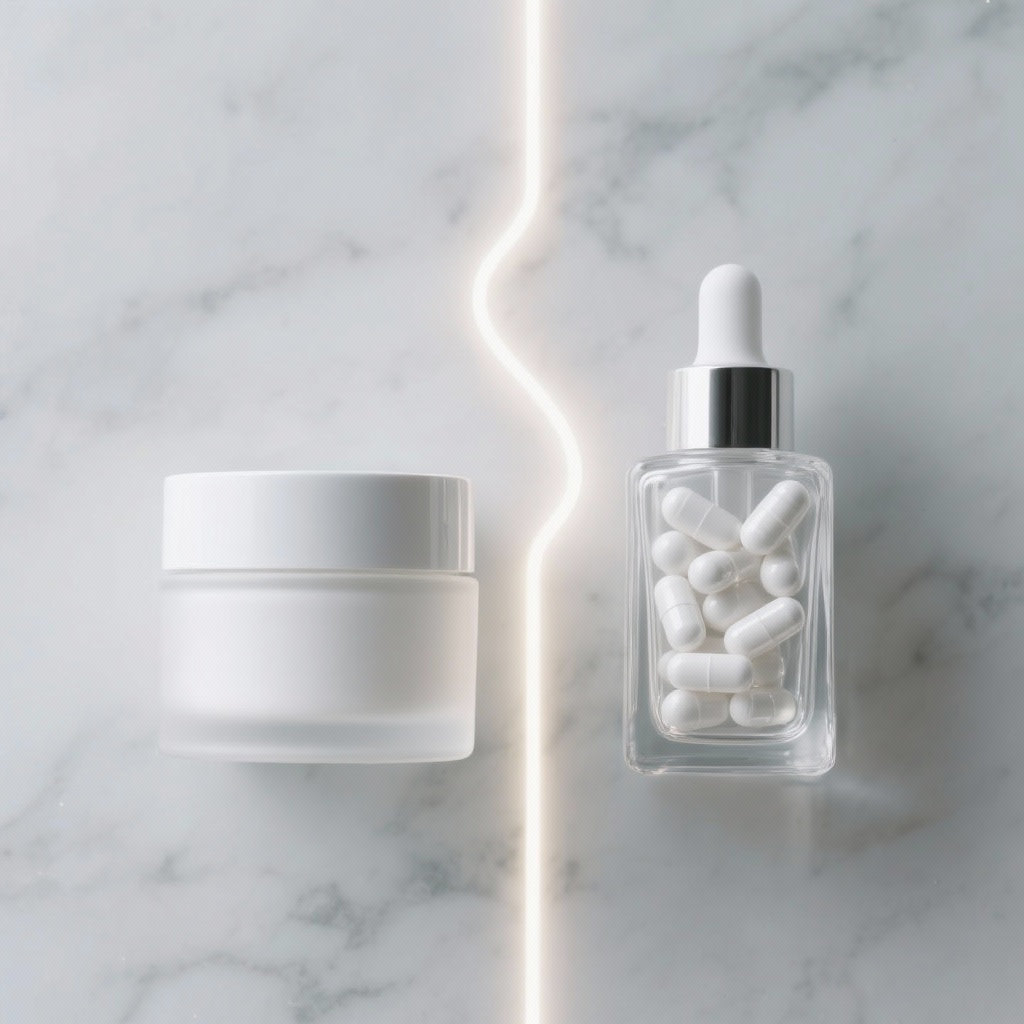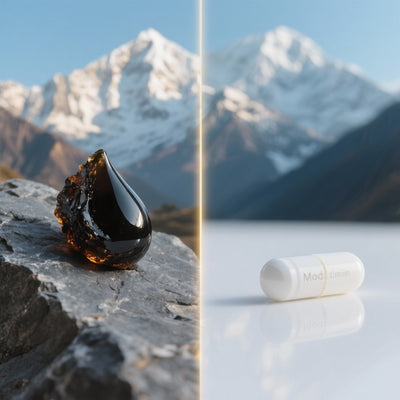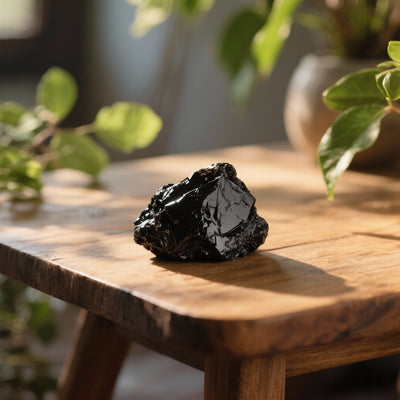Common misconception: Must you choose between external treatments and supplements for beautiful skin?
Miracle creams or magic pills? In the relentless quest for perfect skin, consumers are often faced with a dilemma. The beauty industry, with its clearly defined aisles, leads us to believe we must choose one side: topical treatments, applied directly to the skin, or dietary supplements, which work from within. This opposition is not only an oversimplification, but it also deprives us of the most effective approach. The true key to healthy, resilient, and radiant skin lies not in a choice, but in synergy. This article will deconstruct this misconception and show you why combining "in" and "out" skincare is the smartest strategy for achieving your skincare goals.
The Indispensable Role of External Care: The First Line of Defense
Before looking inside, it's crucial to understand the role of what happens on the surface. Our skin is first and foremost a barrier, our first line of defense against the outside world. External, or topical, skincare products are designed to strengthen, protect, and repair this essential barrier.
Protection Against Environmental Aggression
Every day, our skin faces a multitude of aggressors: UV rays, pollution, temperature variations, fine particles... A vitamin C serum in the morning, for example, is more than just a simple "radiance" treatment. It's an antioxidant shield that neutralizes free radicals generated by these environmental stressors, thus preventing premature aging and the appearance of dark spots. A good sunscreen, meanwhile, is your skin's essential life insurance. These protective actions are immediate and targeted, a mission that supplements alone cannot accomplish with such precision.
Hydration and Targeted Surface Action
When you apply a hyaluronic acid serum, you provide the skin's surface layer with an instant dose of hydration, plumping dehydration lines and giving it a more youthful appearance. Similarly, active ingredients like salicylic acid or retinol act directly on the epidermis to address specific issues such as acne or cell renewal. This is the major advantage of topical skincare: a rapid, targeted, and visible improvement in the skin's surface quality.
"Thinking that a topical treatment can solve everything is like trying to repair the foundations of a house by simply repainting the walls. It's essential for appearance and protection, but the underlying structure remains unchanged."
The Limitations of the Topical-Only Approach
However, the effectiveness of creams has its limits. Most cosmetic molecules, due to their size, struggle to penetrate beyond the epidermis to reach the dermis. Yet, it is in this deep layer that fibroblasts are located, the factories that produce collagen, elastin, and hyaluronic acid – the true pillars of skin firmness and elasticity. External care can stimulate these factories, but it cannot provide them with the raw materials necessary for optimal function. This is where an internal approach comes in.
The Power of Supplements: Nourishing Your Skin from Within
If external treatments are the guardians of the temple, then dietary supplements are the architects. The "In" approach consists of providing the body, via the bloodstream, with the nutrients and building blocks it needs to construct and maintain healthy skin from within.
Building the Foundations: Collagen, Keratin and Elastin
Taking a collagen peptide supplement, for example, isn't about "sending" collagen directly into the skin. It's about providing the body with the specific amino acids that are the precursors to collagen. These peptides signal fibroblasts to restart their own production. You're not just adding collagen; you're reactivating the process. It's a fundamental, structural action that improves skin density and firmness over the long term.
A Global and Systemic Action
Unlike a cream applied to the face, ingested nutrients benefit the entire body, including the skin, hair, and nails. The benefits are comprehensive. A course of zinc or selenium, for example, helps regulate sebum production and combat inflammation systemically, which can be particularly beneficial for acne-prone skin. To learn more about the key ingredients, feel free to visit our information blog .
Essential Nutrients for Radiant Skin:
- Collagen peptides: For firmness and elasticity.
- Hyaluronic Acid (oral route): For deep and lasting hydration.
- Vitamin C: Essential for collagen synthesis and a powerful antioxidant.
- Zinc: Helps with healing and regulates sebum.
- Biotin (Vitamin B8): Contributes to the health of the skin and hair.
- Antioxidants (Vitamin E, Selenium, Coenzyme Q10): Protect cells from internal oxidative stress.
The "In & Out" Synergy: The Winning Duo for Radiant Skin
The real magic happens when these two approaches cease to be competitors and become partners. One protects and corrects on the surface, the other builds and strengthens at a deeper level. They don't add up, they multiply.
A Concrete Example: The Fight Against the Signs of Aging
Imagine that you want to improve the firmness of your skin and reduce the appearance of wrinkles.
- External action: You use a retinol serum in the evening. Retinol will accelerate surface cell renewal, smooth skin texture, and diminish fine lines. It will also send a stimulating signal to fibroblasts.
- INTERNAL action (In): You take daily supplements of collagen peptides and vitamin C. This provides the fibroblasts (already stimulated by retinol) with the exact materials they need to produce quality collagen.
The result? Retinol prepares the ground and gives the order to build, while the supplements provide the bricks and mortar. One without the other would be far less effective.
+25%
This is the additional improvement in skin elasticity observed in some studies when collagen supplements are combined with a topical skincare routine, compared to topical skincare alone.
Case Study: Dehydrated Skin and Dull Complexion
Does your skin feel tight and lack radiance?
- External action: A hyaluronic acid serum will immediately saturate the upper layers of the epidermis with water for a visible plumping effect. A good moisturizer will then seal in this hydration.
- INTERNAL action (In): A course of supplements based on hyaluronic acid and ceramides will help the skin to better retain water from within and strengthen the skin barrier, thus reducing insensible water loss.
You are acting on both the symptom (surface dehydration) and the cause (the skin's ability to retain water).
How to Create Your Holistic Routine?
Setting up an "In & Out" routine is simpler than it seems. It's about thinking about your routine in a comprehensive and coherent way.
- Identify your priority need: Is it hydration, firmness, radiance, or fighting imperfections?
- Choose your targeted external treatments: Select serums and creams containing active ingredients known to address your specific issue (e.g., hyaluronic acid for hydration, vitamin C for radiance).
- Select complementary supplements: Look for supplements that support the same goal from within (e.g., hyaluronic acid capsules, collagen peptides).
- Don't forget lifestyle: A healthy diet is the first step in "in" wellness. Get inspired by our recipe suggestions on our blog to complement your approach. A holistic approach also includes sleep, stress management, and physical activity—topics we cover on our lifestyle blog .
Your Questions, Our Answers
How long does it take to see the results of an "In & Out" approach?
The results of external treatments can be visible within a few days (hydration) to a few weeks (radiance, improved skin texture). Supplements have a deeper effect. It generally takes a complete skin renewal cycle, or 4 to 6 weeks, to begin to see benefits, with optimal results after a 3-month course.
Is it possible to take several dietary supplements at the same time?
Yes, combining certain supplements (e.g., collagen and vitamin C) is often beneficial. However, it's important not to exceed the recommended daily doses and to check for any contraindications. If in doubt, consult a healthcare professional.
Is the "In & Out" approach suitable for all skin types?
Absolutely. It's a strategy, not a fixed set of products. Whether your skin is oily, dry, combination, sensitive or mature, the principle remains the same: simply adapt the active ingredients in your external skincare and the nature of your supplements to your specific needs.
Conclusion: Stop Choosing, Start Combining
The idea that you have to choose between external treatments and dietary supplements is a myth that harms our skin. True excellence in skincare lies in understanding that the skin is a complex ecosystem that nourishes and protects itself from both external and internal sources. By adopting an "In & Out" strategy, you don't just mask problems; you build the foundation for lastingly healthy, strong, and radiant skin.
So, the next time you evaluate your routine, ask yourself: are my external and internal care working as a team?







